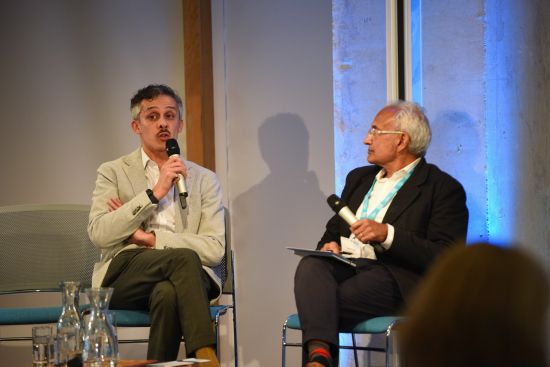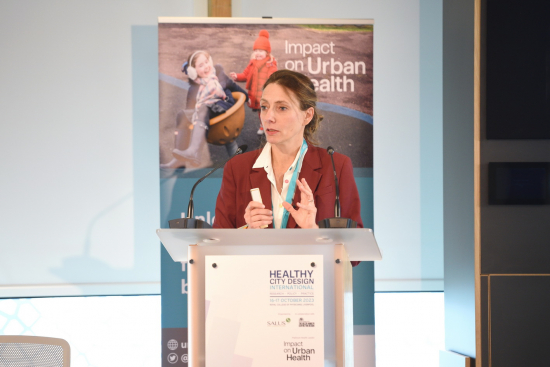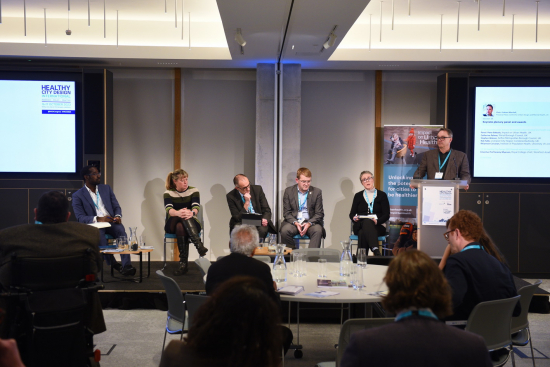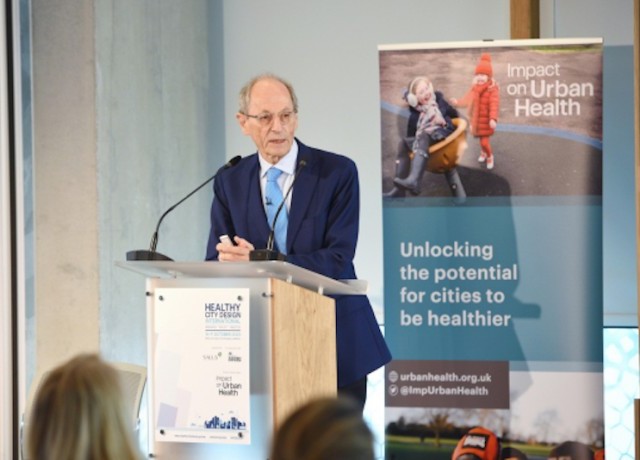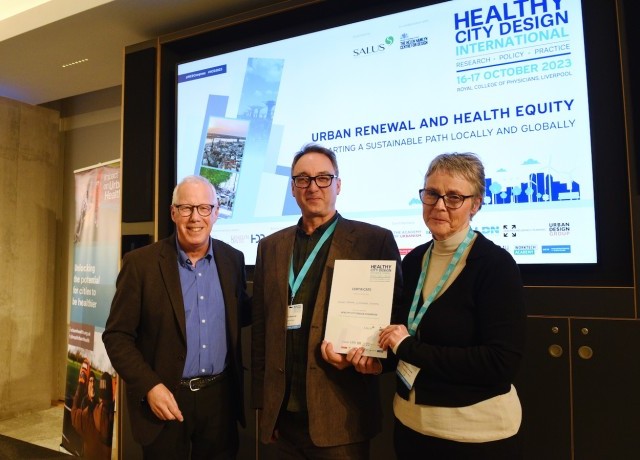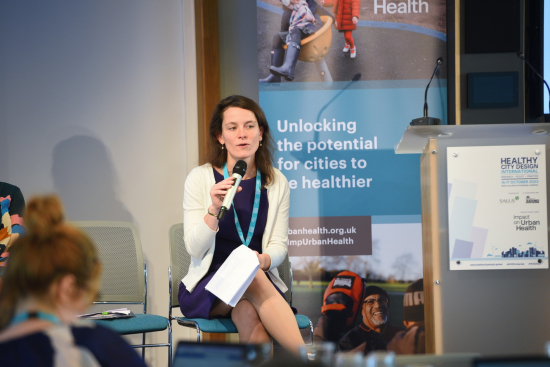
Keynote summary: Housing and health equity – a systems-focused and mission-oriented approach
When it comes to addressing health equity, of which housing is a key issue, there are three pieces to the puzzle – firstly, there is a need to centre policy and solutions around the people who are affected by this injustice; there is a need to act across sectors and with different players who can make a difference; and there is a need to shift away from a focus on individual behaviour.
This was one of the key messages shared at a special lunchtime panel discussion, hosted by Impact on Urban Health at the Health City Design International Congress in Liverpool.
Barbara Reichwein, a programme director at Impact on Urban Health leading on social determinants of health, part of Guy’s & St Thomas’ Foundation, introduced the session, which explored a range of methods and approaches proposed and implemented by partners to address the issue of inadequate, precarious housing and its effect on health.
Setting out the context for the UK, she argued that the overall health of the population in Britain is not in great shape, Moreover, not only can we not afford the ill health that currently exists – ill health in Britain costs the economy around £43bn a year – but neither can we afford the ill health coming down the line.
“In cities, there is such a stark difference between the haves and have-nots in terms of health, that it’s actually a question, in South London where we work, of who gets to live up to 12 years longer. . . And that inequity is in no way abstract, it’s deeply, deeply personal.
It’s often minoritised groups, such as the Black population, who pay the heaviest price, leading Reichwein to conclude that “we can’t achieve health equity and healthy cities without race equity”.
While there are some solutions to these issues, we are not making sufficient use of them, she added, highlighting three that could reduce the triggers for the health crisis: the food system; the household debt crisis in Britain – and failure to build wealth across generations in the country; and reform of the rental system, including the scrapping of no-fault evictions.
“Our homes need to be suitable for our needs, they need to be affordable, and there needs to be tenancies that are secure and stable,” she remarked.
“Humanity is worth investing in”
Maria Morgan, from Kineara, an organisation that creates and offers holistic support intervention programmes that help people facing challenging times, explained to delegates how it deals with myriad interconnected issues in this field, such as insecure housing, long-term unemployment, education, and physical and mental health.
“We believe that healthy people contribute to healthy communities and environments, and we believe that humanity is worth investing in,” she said.
Morgan went on to describe how these interconnected issues fit into a housing rent arrears programme, which Kineara is delivering in Southwark, London and which builds on an earlier initiative. “For housing and rent arrears, we thought why don’t we build a programme around rent arrears being a trigger and identify the root causes as to why a person got into rent arrears in the first place?” she explained.
“We saw that within about four months we could resolve the rent arrears and get people into a stable way of paying their rent. Then it was the wider issue that we spent more time dealing with, because that was the issue that brought those rent arrears back and you had a revolving door.”
The organisation was able to support around 90 per cent of people in sustaining their tenancy while also dealing with the systemic issues prevailing in that area. “So now we use that model and adapt it to work with the private rented sector, the council, and renters – dealing with those knotty, grey, difficult conversations,” she said.
 Joey Carr, a case worker from the Safer Renting Initiative, at Cambridge House; and Ricky Burdett, from the Council on Urban Initiatives
Joey Carr, a case worker from the Safer Renting Initiative, at Cambridge House; and Ricky Burdett, from the Council on Urban Initiatives
“When housing goes wrong, a lot of other things can go wrong”
A deeper dive into the health and justice issues around renting and precarious living arrangements was provided by Joey Carr, a case worker from the Safer Renting Initiative, at Cambridge House. Carr’s role is to help tenants understand their rights, advocate for them, if need be, with their landlords and with external matters, such as a court hearing.
She elaborated: “The main issues we deal with are illegal evictions, where someone is forced to leave their home without proper due process having been followed, harassment, . . . a failure to license and rental increases. And we work alongside council environmental health departments to deal with issues of disrepair, and helping tenants when they’ve got possession claims, such as a no-fault eviction that isn’t being done correctly or a rent arrears claim.”
Undertaking research to assess the number of recorded illegal evictions in the UK, the orgnisation found that in 2020-2021, there were 6930 such evictions, resulting in a mere 12 convictions. In 2021-2022, the figure was 7778, which resulted in 29 convictions, and in 2022-23, the number of recorded illegal evictions surpassed 8000.
“All this factors into health and mental health a lot because housing insecurity is an enormous cause of these problems.” she said. “When housing goes wrong, a lot of other things can go wrong.”
While the organisation usually works with councils, it’s now exploring, alongside Impact on Urban Health, how it can operate without the council as a referring partner, in order to better understand the inequalities that drive exploitation by landlords or difficulties in accessing safe and secure housing. This, says Carr, will enable the agency to “look into all the barriers into accessing justice and accessing advice, whether that’s age, not being able to speak English, being illiterate, not being able to use technology”.
The organisation is also carrying out research into how access to justice and access to advice, by themselves, can help improve people’s mental health.
We believe that healthy people contribute to healthy communities and environments, and we believe that humanity is worth investing in
“Cities are housing and housing is deeply social”
Concluding the panel presentations was Ricky Burdett, from the Council on Urban Initiatives, which was set up following a call from UN secretary-general António Guterres to use the pandemic “to reflect and reset how we live in, interact with and rebuild our cities”.
The Council is interested in the interconnections between justice, health, and the climate change agenda, at the heart of which housing sits, Burdett explained, but he also stressed that any conversation around housing and justice needs to adopt a global perspective. In this regard, he pointed out that 1 billion more people will be moving into cities in Africa or Asia over the 40-year period 1990-2030 – “many in situations of inadequate housing for sure, inadequate sanitation, and much more”.
He added: “The other thing to remember when connecting cities and housing is that cities are housing... Most of the surface of cities is made up of housing. And housing itself is deeply social.”
Moving on to the Council’s new paper outlining a ‘Mission-Oriented and Human Rights Based Approach to Housing’, authored by the Council’s Mariana Mazzucato and Leilani Farha, Burdett explained that the drivers of the housing crisis are diverse. They include rapid and unplanned urbanisation, particularly in the Global South, and inadequate housing supply.
Another major problem surrounds the financialisation of housing – where housing is seen as an economic asset and investment, not a human right; housing is now estimated to be worth more than three times the world’s global GDP.
“Therefore,” lamented Burdett, “the way you treat it is not for the good of the people but it’s just an investment you have for a certain period of time and then you get rid of it. You move on with other goals. And the only way to deal with that is through a whole-of-government, mission-orientated approach.”
A further dynamic is climate change. Housing and the built environment are carbon-intensive, while natural disasters affect people living in risk-prone areas, but Burdett remains hopeful that given the importance now placed on the climate agenda, there may also be opportunities to address housing in concert.
Setting out a ‘right to housing framework’, the paper recommends policymakers commit to a housing mission; shape the housing market, not tinker with it; build an entrepreneurial state; focus on public-private partnering for the common good and public value-driven financing and taxation; as well as ensure monitoring and accountability.
Highlighting some examples of positive change, Burdett pointed to Bogota, Colombia, where the mayor has implemented a policy to retrofit much of the housing and turn “squalid, unsafe conditions into something decent”. While in Barcelona, there is “an approach to new housing and collective housing in areas of the city that are being repopulated, rather than being emptied out after industrial rezoning”.
He concluded by emphasising the need to look beyond the issues of the housing unit itself. “How you fit into a wider community, how you get there in terms of transport, whether there is a school nearby, whether there are shops, whether there is an open park – these are essential to the quality of housing.”
Event news
Investing in urban renewal and health equity
21st March 2024
Health equity: Marmot Cities
20th March 2024
Housing and health equity
20th March 2024



